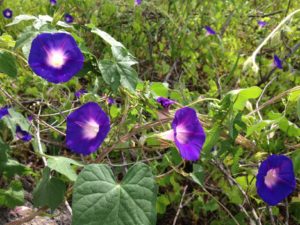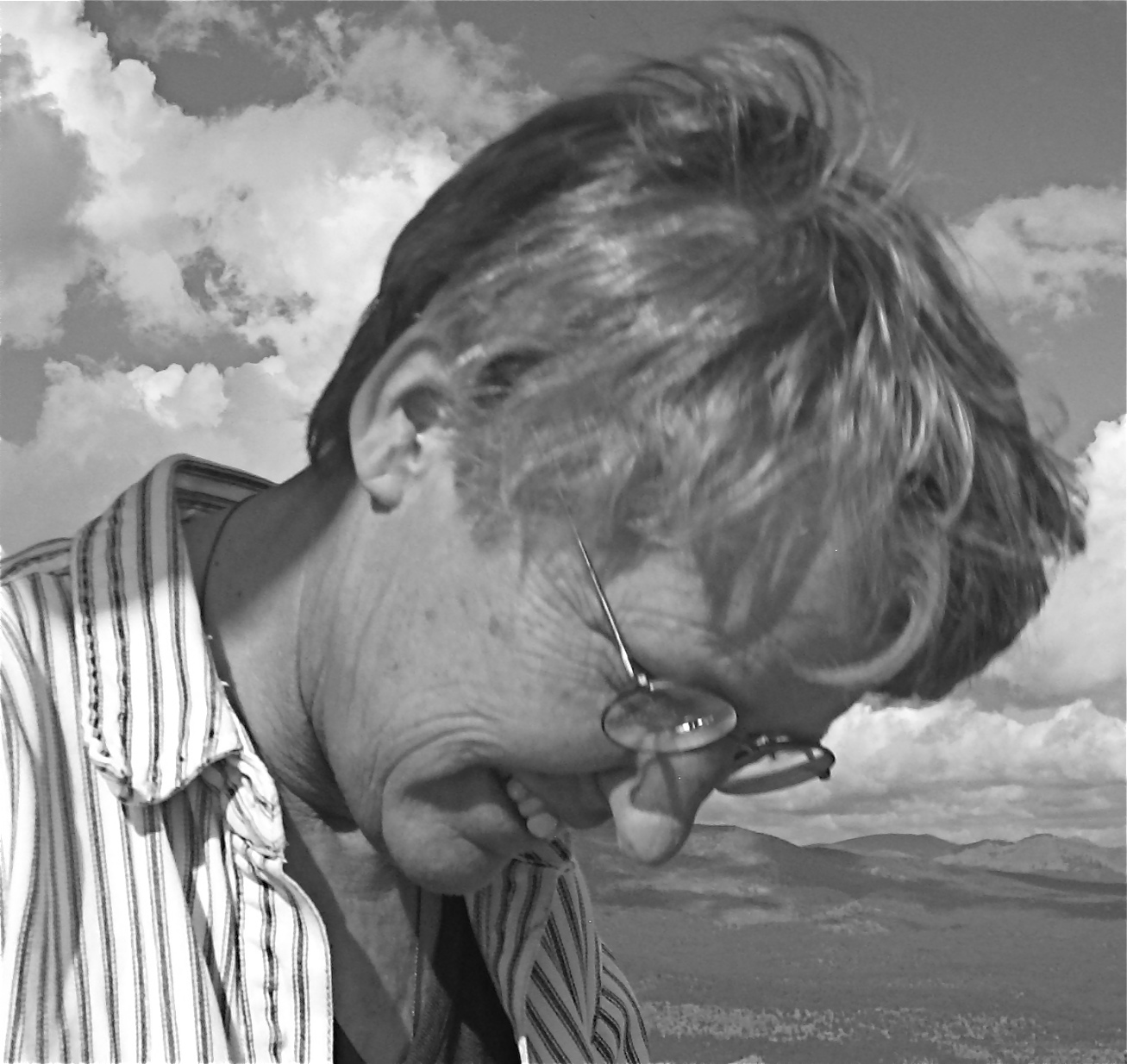 On my way to watch the eclipse of the century, I didn’t fuss about a reservation or add miles to the odometer of my old truck. Instead, for four mornings in a row, I worked on my whole-body tan and read a book. I did consider joining the crowd wearing the funny glasses on Mars Hill. (Don’t those glasses make people look like they are in a scene from a 1950s sci-fi flick?) I thought also about joining the volunteer rangers out at Wupatki; an eclipse moment with ruins felt like it might ring a pleasing ancient note. But not for me, a pilgrimage or photo op. Instead, presence with stillness on a Prescott porch where hummingbirds hover and large yellow butterflies waft. New canyon wrens hop across curves of granite boulders chasing bugs. Will they pause for the celestial show, I wonder?
On my way to watch the eclipse of the century, I didn’t fuss about a reservation or add miles to the odometer of my old truck. Instead, for four mornings in a row, I worked on my whole-body tan and read a book. I did consider joining the crowd wearing the funny glasses on Mars Hill. (Don’t those glasses make people look like they are in a scene from a 1950s sci-fi flick?) I thought also about joining the volunteer rangers out at Wupatki; an eclipse moment with ruins felt like it might ring a pleasing ancient note. But not for me, a pilgrimage or photo op. Instead, presence with stillness on a Prescott porch where hummingbirds hover and large yellow butterflies waft. New canyon wrens hop across curves of granite boulders chasing bugs. Will they pause for the celestial show, I wonder?
Friday
A lone vulture circles over Gurley Street. Maybe it will glide to the courthouse square to poop on a park bench to show its disdain for the hoopla humans concoct. “Cynicism flourishes in air-conditioned rooms,” writes Terry Tempest Williams in her most recent book, The Hour of Land, A Personal Topography of America’s National Parks. “Our fear of being touched removes us from the sensate world. The distant self becomes the detached self who no longer believes in anything.” I re-arrange my hot tea so I can put my feet up on the railing. A kiss of air travels up my leg. Williams is musing in Big Bend National Park, and, of course, she does more than describe cactus, lizards and roadrunners. Remember her at the podium one winter night at Prochnow Auditorium? Not quite 10 years ago, maybe. That night the idea of how mosaics can heal brokenness offered an organizing principle to her ideas on beauty. Now she brings us the national parks with familiar intensity and intimacy.
Saturday
Warmth. Heat. I feel lucky to have this time for a spacious sit on the way to the eclipse. Today I notice the air vibrates with difference between 9 a.m. and 11 a.m. Chill from a breeze arriving feels different than chill that sinks out of a growing cumulus cloud. I’m thinking again about the air-conditioned rooms Williams mentioned. How I rebel in air-conditioned rooms. I can’t sit long where the air feels robotic. “In wilderness, we are defined by the body not the mind,” writes Williams visiting Gates of the Arctic National Park. True, and don’t I also love taking my mind to this porch each day to travel into pages of images and ideas. When she notices the feather-like quality to the undersides of balsam firs, I can almost smell a branch. At Acadia National Park, that “marriage of wind and sea,” I stand by a rocky cliff with her. “Acadia is a breathing space. Perhaps that is what parks are: breathing spaces for a society that increasingly holds its breath.” No breath holding on this porch. And no balsam firs. Two blue jays scramble through the curving forked branches of a scrub oak.
Sunday
This morning when I opened the cabin door to sunrise there was the smell of rain all around, musky and sweet. Windless all morning. Thick air. If the eclipse happened today it would be a Turner painting of subtle shifts of light. Still today but not exactly tranquil. The Star Wars spaceships of hummingbirds challenge each other with sharp zooming noises over my head as I read. Or are they wizards on brooms playing Quidditch? I see veils of rain smeared against Mingus Mountain. I wonder if Katie Lee is peering out the windows of her hillside home in Jerome. This Hour of Land is a masterful weave from a lifetime of treasuring outdoor places, I think, pleased with the last pages. I sigh and sit and look. I wonder what threads I’d gather together in 14 chapters by my own hand. I brush croissant crumbs from the cutting board onto the pebbles of an ant nest. I feel like I am also sweeping accumulated cares that keep evaporating each morning. Rambling rhetoric clinging to my back brain, my multiflora misgivings, that garden I water with my tendency to overthink things. Carry it all away, dear ant friends, give the good bits to the queen, please.
Monday
Today the clouds are cottage cheese. They float by with stray gaps of blue. Sunrise painted them orange awhile. I raised my iPhone to catch an outline of a hovering hummingbird against dark pine tops and clabbered sherbet clouds, and sent it to friends to say, “Welcome to eclipse day.”
9:13 a.m. Stillness, but for a garbage truck accelerating through its rounds on dirt roads. Maybe it is a truck towing clouds. They seem to be breaking up.
9:20 a.m. The sun pops out. I reverse my binoculars to see two eyeballs of light on a sketchbook page. Yes, a piece of each eye is missing.
9:26 a.m. A cricket calling?
9:28 a.m. Cooler air, cooler than mere cloud cover. My skin from head to toes is puzzled.
10:01 a.m. Even cooler air and such rich leftover light. The small blue flowers on a vine seem to open up and up toward the sky with questions.
11:20 a.m. In my rocking chair on the porch of a good cabin, I doze off. Not bored, but lulled by tranquil stillness.
When I wake up after noon I catch sight of a snake between porch steps and boulder. Three feet of red, black and yellow king snake oozes across dirt into tall grass and brush. I’m too excited at the sight to catch more than a dozen seconds of video. Was it watching the eclipse from under the porch? I send the video to my friend Michele who messages back to say, “It looks like it has many eclipses on its body.” Yes. Little curves of black-like bites out of the sun, oozing into the morning on its mission to eat lizards or do battle with rattlesnakes. A snake carrying the dark blots and the bright crescents of light back into sleeping under rocks. It is a finish to the eclipse of the century that I quite like. And yes, now, the blue flowers have folded in on themselves, like tiny purple fists closed against the light.

